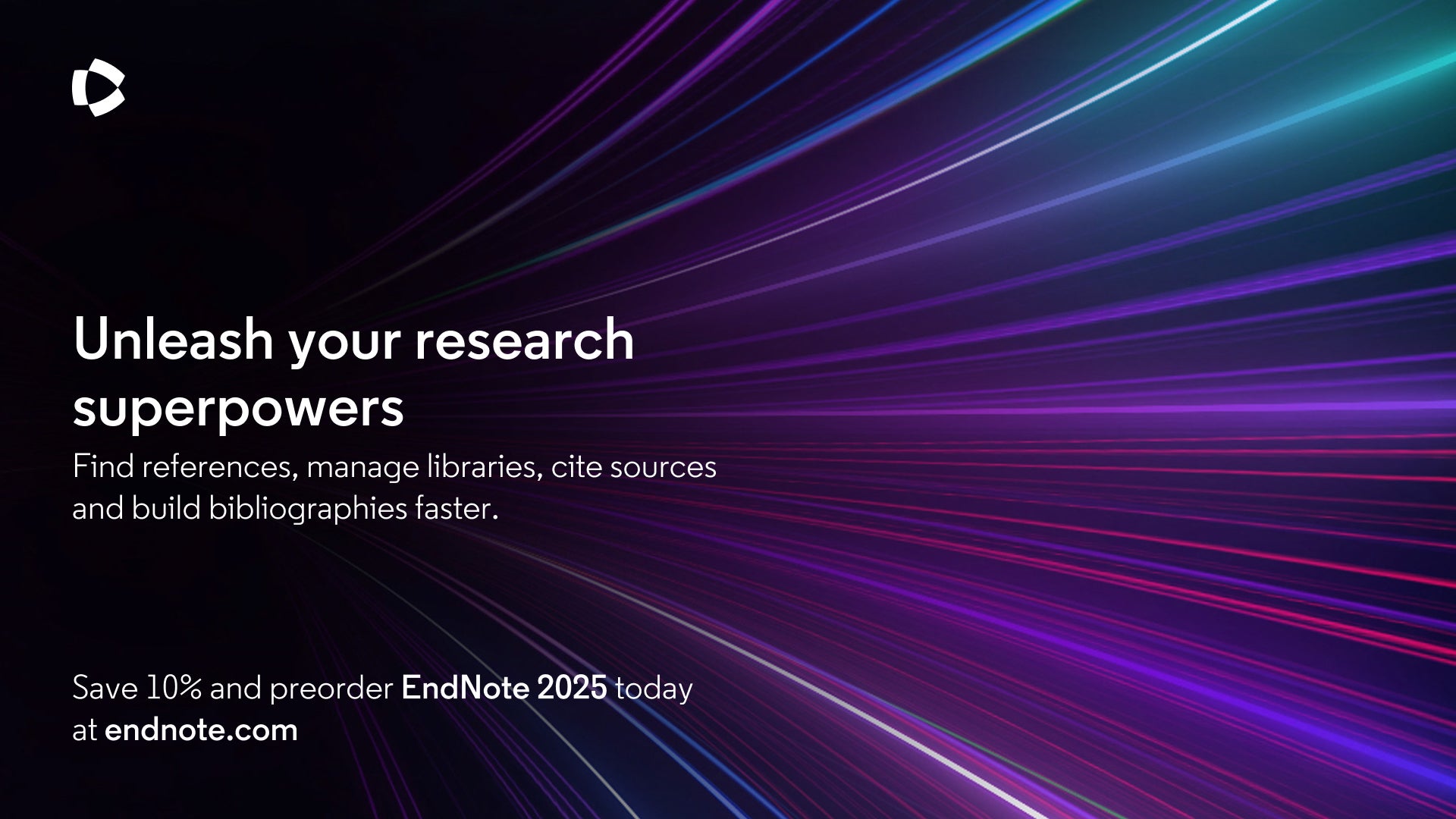Web of Science Research Assistant
A generative-AI-powered tool that helps you quickly find the right content and easily navigate complex research tasks
Enhance your research with a responsibly developed, generative AI-powered tool.
Discover fresh insights faster so you can focus on creating new knowledge. Far more than a chatbot, the Web of Science™ Research Assistant runs alongside you as you work, keeping up with your research needs as they develop. Wherever you are in your career, start getting more out of the world’s most trusted citation database—the Web of Science Core Collection™.
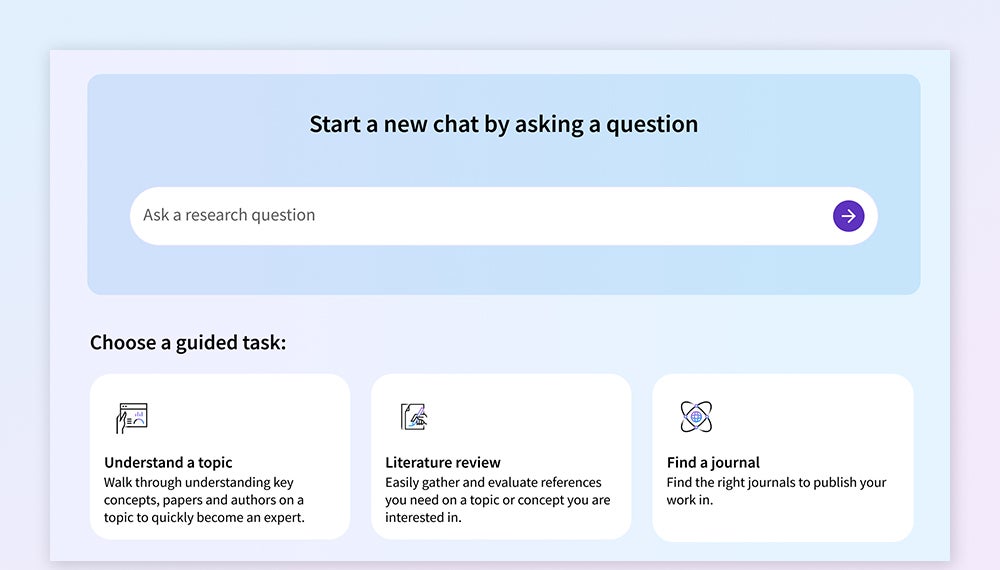
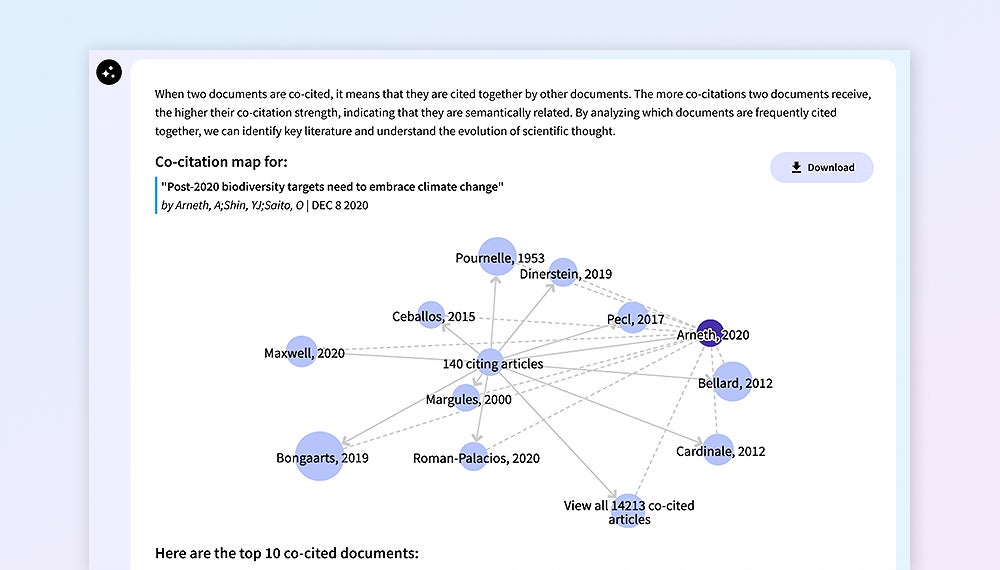
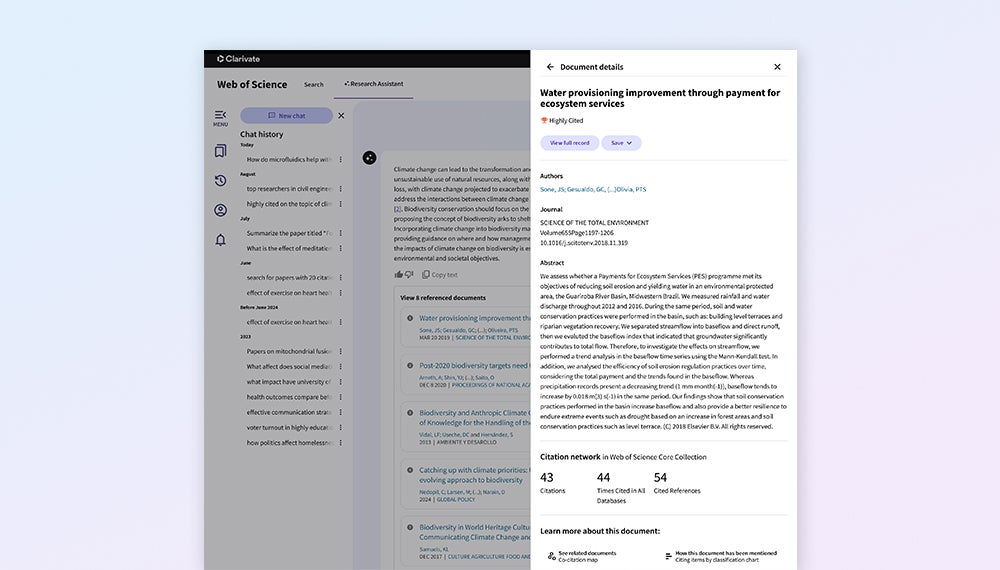
Task-based guidance
Complete complex research tasks faster with guided walkthroughs and contextual prompts that light up potential paths forward.
Intelligent discovery
Spend less time building queries and more time learning from results. Effortlessly interpret and explore the literature with the help of AI.
Responsible AI
Leverage a responsible AI tool developed with and for researchers and optimized for academic research use cases.
Leverage time-saving technologies with confidence
Implement responsible AI tools
High-quality content
Powered by carefully curated data from editorially selected sources—Web of Science Core Collection data—to ensure that the tool delivers insights that add value to your research process.
Community engagement
Developed in partnership with researchers and librarians to ensure that the tool solves the most pertinent problems in ways that deliver trust in the technology and its application.
Responsible application
Designed to help you understand how content is generated and interrogate responses. Aligned with evolving licensing and usage rights in the AI landscape.
Streamline literature review with agentic AI
Introducing an enhanced literature review guide in Web of Science Research Assistant
Optimize your query, identify research gaps and hotspots and formulate hypotheses with the help of the new literature review guide in Web of Science Research Assistant. Powered by responsible Academic AI and trusted Web of Science Core Collection data, the advanced AI agent enables you to synthesize the literature more efficiently.
Cut through the complexity of publication and citation data
Grasp core concepts faster
Conduct natural language searches in several languages and receive concise overviews and commentaries that consider over 120 years of research.
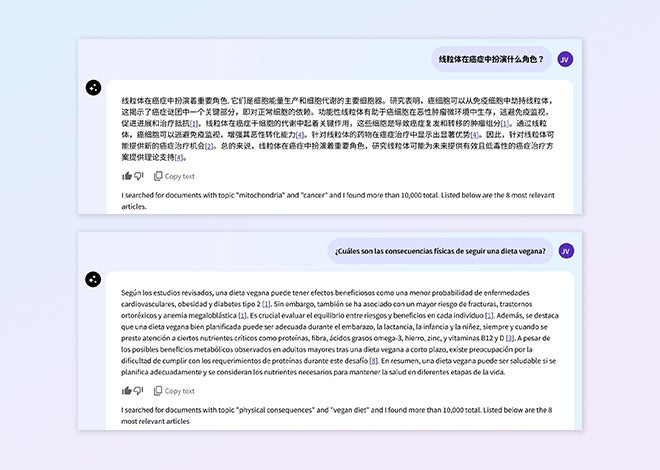
Determine your next research step
Navigate research tasks with guided walkthroughs and save time with context-specific prompts delivered as you work. Identify experts to develop your collaboration strategy.
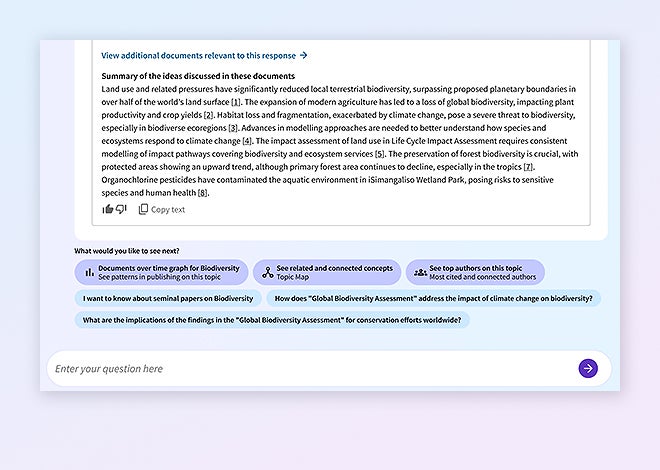
Uncover meaningful connections
Explore dynamic visualizations and carry out light analytics quickly with the help of co-citation networks, topic maps, trend graphs and more.
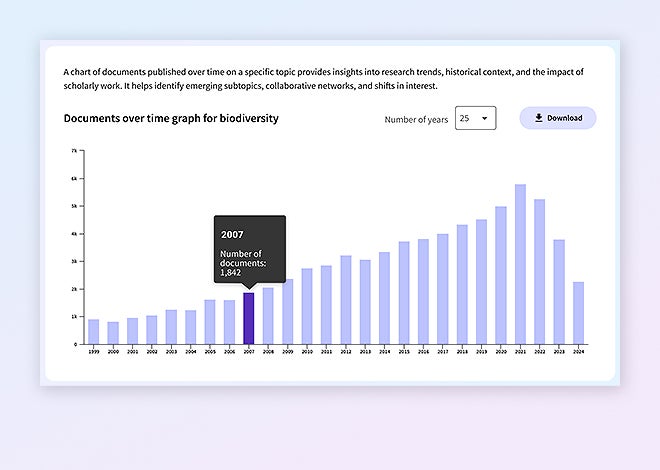
Research smarter
Responsible, academic AI to guide your research journey
What our customers think
What we particularly appreciated was the obvious care, time, and caution in which the company (Clarivate) went about developing its AI products. It spent a great deal of time with librarians and scholars to find out their research hurdles and how AI could be used to help them overcome them.
Reprinted with permission from Information Today from "Traditional Online Vendors Are Embracing Generative AI," The Information Advisors Guide to Internet Research Vol 36 no.4 July/August 2024. www.informationadvisor.com
We’re happy to be part of the Web of Science Development Partner Program, it will allow us to know deeply the new AI Research Assistant and how it can help our researchers.
Camila Gamba Universidade de São Paulo
It's very efficient, it's going to save a lot of time with conducting research, having to read through all the abstracts, having to determine relevance on reading alone.
Beta tester Research institution
We’re excited about the AI features that Web of Science is developing. I think Web of Science Research Assistant will be far superior to the other genAI tools currently available to faculty and students at the moment.
Juan P. Denzer Engineering & Computer Science Librarian, Syracuse University
We chose to engage in the Web of Science development partner program due to the database’s reputation for credibility and reliability. The high quality articles available through Web of Science, coupled with the opportunity to experience a trial period, provided us with a positive and valuable experience.
Li-Ling Ou Assistant Administrator, Division of Knowledge Service
National Cheng Kung University Library
I believe Web of Science Research Assistant is moving in the right direction because Web of Science is already committed to providing trusted information that is aligned with sound academic research practices. With the Web of Science Research Assistant, all library staff, faculty and students at our university got to participate as beta testers and provide feedback. Not all companies producing AI research tools consider academics, but the Web of Science team made it a priority to listen to researchers.
Juan P. Denzer Engineering & Computer Science Librarian
Syracuse University
As we tested the Web of Science Research Assistant, we recognized that it has huge potential for surfacing useful papers and content and helping students and researchers take a deep dive into content faster. I especially appreciate the visualizations, which are easy to access as you work with the assistant. They provide different ways to assess results and discover links between topics, organizations, and researchers. Researchers need to trust the research they are using, and the Web of Science provides a trusted and safe environment for AI-powered discovery. The assistant solves the problem of information overload while also ensuring quality and reliability in its responses.
Elizabeth Killeen Life Sciences Librarian
Imperial College London
Resources


Web of Science Research Assistant elevates discovery with responsible AI
The Web of Science™ Research Assistant, a generative AI-powered tool built with and for researchers, is now available to the global research community. After extensive collaboration and testing with the…
Frequently asked questions
When you submit a question to the assistant, it starts by retrieving articles that exhibit the highest degree of semantic similarity to your query and then complements those with additional highly relevant results based on keywords. From there, it ranks results based on a similarity score and runs them through a proprietary algorithm to ensure that the most valuable and pertinent resources are highlighted. Top publications are then chosen to formulate a response to your query. Additional layers of relevancy ranking reduce noise in your results sets.
We use commercially provided pre-trained Large Language Models in a Retrieval Augmented Generation architecture (RAG). We do not train our own models. While we are using the pre-trained LLMs to support the creation of narrative content, the facts in this content are generated from our trusted academic sources. We test this setup rigorously to ensure academic integrity and alignment with the academic ecosystem. Testing includes validation of responses through academic subject matter experts who evaluate the outputs for accuracy and relevance. Additionally, we conduct extensive user testing that involve real-world research and learning scenarios to further refine accuracy and performance.
We are committed to the highest standards of user privacy and security. We do not share or pass any publisher content, library-owned materials, or user data to large language models (LLMs) for any purpose.
Data privacy and trust are top priorities when designing our AI tools. We comply with data privacy regulations and adhere to the evolving global AI legislation.
As part of the user query, only the content that users themselves input into the query is transmitted to the LLM. No additional data is shared during this process, ensuring the protection of sensitive information. Furthermore, we are not using any of the LLM API endpoints directly but accessing LLMs through a private setup. This ensures that data entered by users in the query stays protected and cannot be seen or accessed by any other party. This approach to data protection aligns with our practices in academic search, where we apply our knowledge in securely managing user information. For more information on our privacy and data protection program, visit: https://clarivate.com/privacy-center/
We have developed the Clarivate Academic AI Platform that is designed to help us bring existing and new solutions to the market faster and support multiple use cases at scale. The platform will allow us to deliver more capabilities, such as semantic search and more, with a consistent user experience, in a safe and secure environment that ensures user privacy and data security. The platform will serve all Clarivate academic solutions.
The AI Platform is not just about infrastructure. The AI Platform team serves as an AI center of excellence with strong LLM stewardship, supporting the different product teams in using AI responsibly, and providing strong governance to make sure that AI is applied responsibly. The team also works closely with the community. They have built an AI Advisory council, with the goal of sharing insights & findings, evaluating results, gathering feedback from librarians, students, and faculty, mitigating inaccuracies & bias issues, and sharing adoption best practices.
Ensuring clarity and trust in our solutions is one of our top priorities. Our conversational discovery and AI-powered tools present a list of academic resources on which their responses are based, so that you can always explore relevant materials for further context.










